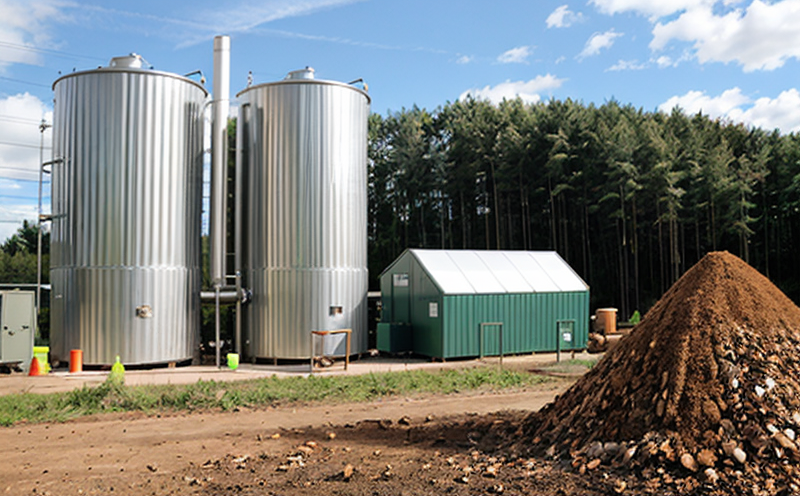ASTM D5865 Gross Calorific Value of Waste Fuels
The ASTM D5865 standard method is a crucial tool in waste management and recycling testing, particularly when assessing the calorific value of waste fuels. This test evaluates the potential energy content of various solid wastes that can be converted into fuel, thereby providing valuable information for waste-to-energy conversion processes.
Waste materials such as municipal solid waste (MSW), construction and demolition debris (C&D), agricultural residues, and other organic by-products are often considered as viable sources for generating energy. The gross calorific value (GCV) determines the amount of heat produced when these fuels are combusted under controlled conditions.
The GCV is a significant metric in waste-to-energy projects because it helps determine the potential of a particular waste stream to generate electricity or heat. By measuring this value, stakeholders can make informed decisions about which waste materials to prioritize for conversion into energy sources like biomass pellets, refuse-derived fuel (RDF), and other forms of bioenergy.
The ASTM D5865 method is widely used in the quality management of solid waste facilities, ensuring compliance with local regulations. It also plays a critical role in R&D efforts aimed at improving the efficiency and sustainability of waste-to-energy technologies. For procurement teams, this standard offers guidance on selecting high-quality fuel sources that meet specific GCV requirements.
Understanding the ASTM D5865 procedure is essential for those involved in waste management, recycling, and energy production. This method ensures accurate and consistent measurement of calorific value across different types of solid waste materials, promoting reliable data for decision-making processes.
Applied Standards
The ASTM D5865 standard is recognized internationally as a key reference in the field of waste management and recycling. It specifies the procedures for determining the gross calorific value of solid waste fuels by bomb calorimetry, which provides an accurate representation of the heat energy available from these materials.
Compliance with ASTM D5865 ensures that waste-to-energy projects adhere to high-quality standards, facilitating better decision-making regarding fuel selection and process optimization. This standard is applicable across various sectors including municipal solid waste management, construction and demolition recycling, agricultural waste utilization, and industrial by-product processing.
The method described in ASTM D5865 aligns with broader environmental goals by promoting sustainable resource use and minimizing landfill waste. Its application supports the development of renewable energy sources from otherwise discarded materials, contributing to global efforts towards a circular economy.
Scope and Methodology
| Key Elements | Description |
|---|---|
| Sample Preparation | The sample must be dried to a constant weight at 105°C ± 3°C. This ensures accurate measurement of the calorific value without affecting moisture content. |
| Sampling Technique | A representative sample should be taken from multiple locations within the waste stream to ensure that it accurately reflects the overall composition and quality of the material. |
| Calorimetric Analysis | The bomb calorimeter measures the heat released during combustion. The oxygen bomb is filled with a known mass of dried sample, ignited, and the resulting heat absorbed by water in the calorimeter. |
| Data Interpretation | The difference between the initial and final temperatures of the water indicates the heat content or gross calorific value (MJ/kg). |
The ASTM D5865 method provides a robust framework for assessing waste fuels, ensuring that all relevant factors are accounted for in the measurement process. This approach guarantees reliable results that can be used to optimize fuel quality and enhance energy production efficiency.
Eurolab Advantages
Eurolab specializes in providing comprehensive testing services tailored specifically to the needs of waste management and recycling industries. Our team of experts ensures that every sample undergoes rigorous analysis using state-of-the-art equipment, including high-precision calorimeters.
We offer fast turnaround times with accurate results, which are crucial for timely decision-making processes. By leveraging our extensive experience in this field, we can help clients identify suitable waste fuels and optimize their conversion into renewable energy sources.
Our commitment to quality is reflected not only in the precision of our measurements but also in the thoroughness of our reports. Each report includes detailed descriptions of the testing procedures followed along with clear interpretations of the results. This comprehensive approach helps ensure that clients have all necessary information when making strategic choices related to waste management and recycling.
In addition, Eurolab maintains strict adherence to international standards such as ASTM D5865, ensuring consistent accuracy across all tests performed. Our dedication to excellence makes us a trusted partner for industries seeking reliable data on waste fuels' calorific values.





